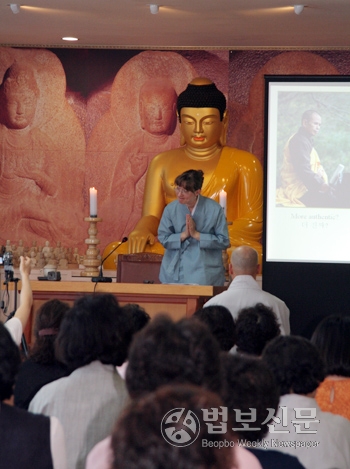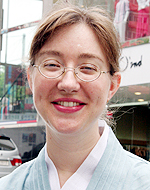“모든 종교엔 종류 다른 수행과정 있어
각 종교가 어떤 방법으로 인간 성품을
맑고 향기롭게 정화하는가 공부하길”
|
내가 어렸을 때 아버님은 나에게 “불교는 종교가 아니다”라고 가르치셨다. “불교는 철학이고 심리학이며, 생활양식”이라고 말씀하시곤 했다. 나의 부모 세대 서구인들은 그들의 유년기 때 종교인 유대교나 가톨릭, 감리교 등을 대신할 대안으로서 불교의 가르침과 명상수행을 이해했고 이러한 관점이 나의 부모에게서도 그대로 드러난 것이다. 그들은 종교적인 의식과 문화, 신앙, 조직적인 강요를 뛰어 넘어 이성적이고 비독선적인 ‘영적 수행의 길’이 바로 불교라고 규정했다.
나는 학문적 관점에서 불교를 공부하고자 하버드 신학대학에 들어갔다. 신학대학에선 “불교는 종교”라고 배웠다. 그렇다면 가톨릭 교회의 예배와 불교 사원의 예불은 어떤 것이 다를까? 보살과 성인, 염주와 묵주(섬뜩하게도 염주와 묵주의 구슬 수는 108개임), 독송과 성가, 스님과 사제 등은 물론이요, 향과 초, 경전, 의식, 성금 등등 어떤 관점에서 볼 때 불교가 종교와 다르다고 할 수 있겠는가? 서구인에 의해 설립된 명상센터에서 조차도 불교는 종교의 범주에 속하는 많은 의식들과 행위들을 행하고 있는 것을 발견하게 된다. 그러한 과정을 거쳐 졸업할 무렵 불교는 분명히 종교라고 확신하게 되었고 그 이후 10년 동안 나의 이런 판단에는 변함이 없었다.
지난 8월, 노스캐롤라이나에 있는 듀크대학교에서 활동하고 있는 ‘종교적 삶(Religious Life 대학 내의 각종 종교 활동을 지원하는 조직)’의 대표가 발의한 종교 지도자들의 소규모 모임인 ‘신앙회의(Faith Council)’에 불교 대표 자격으로 참석하게 되었다. 터키에서 온 이슬람교의 이맘과 가톨릭의 프란체스코 수도사, 유대교 랍비, 감리교 목사, 루터파 목사, 독실하고 박학다식한 힌두교 공학 교수, 복음 교회파 신자 등이 그 모임에 함께 했다. 매월 같이 모여서 진행하는 그 모임은 공통된 관심사에 대해 깊이 있는 질문을 하고 그에 관해 2시간가량 토론을 하는 형식으로 진행됐다. 각 종교에서 해당 주제에 관한 경전 구절을 제시하고 모두가 함께 경전 구절을 읽었다. 다른 종교에 대해 좀 더 깊이 이해하는 동시에 더 나아가 각 종교에 대해 바르게 평가를 하자는 것이 이 모임의 목적이었다.
랍비와 복음주의자, 이맘은 토론을 위해 각각 다음과 같은 주제를 제시했었다.
9월에는 이성과 계시를, 10월에는 창조와 진화를, 11월에는 과학과 종교를 각각 주제로 내놓았다. 이 모임에서 한 번은 공룡 화석과 인간은 원숭이의 후손이라는 과학적 주장에 대해 토론을 벌였다. 본론으로 들어가 플라스틱 공룡 모형을 가지고 놀고 있는 아이들을 볼 때 아이들에게 무엇을 가르치고 있는지 그리고, 알라와 아담, 이브에 대한 코란의 가르침과 이를 어떻게 양립시킬 수 있는지에 대해 터키 출신의 이맘에게 질문을 던졌다. 그는 아주 명료하게 대답했다.
“사실은 그게 문제입니다. 만약 코란에서 가르치는 창조 신화가 사실이 아니라면 이슬람교의 토대가 위태롭게 됩니다. 그래서 공립학교에서 공룡과 진화론에 대해 배우는 내용으로부터 아이들을 보호하기 위한 별도의 책을 이슬람교 부모들은 가지고 있습니다. 우리는 그것이 틀렸다고 가르칩니다. 아마도 이것은 얼마간은 근본주의적인 측면이 있다고도 할 수 있겠지만 우리는 그렇게 믿고 있습니다.”
바로 이 모임에서 나는 불교의 경우 창조설을 어떻게 받아들이는지에 관해 질문을 받았다. 또 어떻게 우주와 인간이 존재하게 되었는가에 관한 내용과 함께 불교에도 창조 신화가 있는지에 대한 질문도 받았다. 나는 우주의 기원에 대해 간략히 설명하면서 이런 질문은 답변할 수 없으며 부처님께서 말룬카풋타 존자에게 내린 가르침을 담고 있는 ‘중아함경’에 근거해 이러한 내용의 토론 자체가 ‘무익하다’는 불교의 관점을 제시했다. 그러면서 독화살을 맞은 사람이 그 독화살을 누가 쏘았고 그 사람의 계급은 무엇인지, 그 외의 기타 사항들을 자세하게 알게 될 때까지는 의사가 독화살을 제거하지 못하도록 했다는 비유 설화도 들려주었다.
“독화살을 맞은 사람은 그러다가 결국 죽게 될 것이다”라고 강조하면서 “마찬가지로 ‘부처께서는 자기 자신을 구제하기 위해 열심히 노력하는 것이 우주의 기원에 대한 질문에 사로잡혀 있는 것보다 더 중요하고 더 급박하다’라고 가르쳤다”는 설명을 곁들였다.
이러한 불교적인 해답들을 이슬람교나 다른 종교의 그것과 비교하면서 불교적 가르침의 정밀함에 대한 새로운 인식을 밝히게 되었다. 나는 불교의 가르침과 공룡, 진화론, 과학 등과의 갈등은 전혀 없다고 확신한다. 최소한 내가 알기로는 문제가 없다고 본다. 우리 모임의 다른 토론 주제인 ‘신앙과 이성에 대한 불교의 가르침’은 유용하고 또 정밀한 지적 체계라고 믿는다. 아마도 현대의, 철학적인, 존재론적인 질문들에 대한 불교의 답변은 증명될 수도 없는 유일신이나 다신론 또는 믿음에 근거하지 않기 때문에 실용적이면서 명확하고, 합리성에 부합된다. 그러면서도 복잡한 인간 존재의 실상을 무시하지도 않는다.
나 같이 확연하게 깨닫지 못한 보통 사람들이 이해하는 한 불교는 신에 근거하지 않기 때문에 ‘그렇다’고 말할 수 있다. 불교는 비록 여러 측면에서 일종의 종교처럼 보일지라도 종교보다는 철학, 심리학, 생활양식에 더 가깝다. 인간의 실상과 자유에 이르는 길에 대한 불교적 이해가 지극히 ‘독특함’에 대해 나는 진실로 충격을 받았다.
나는 이렇게 말함으로써 불교가 다른 종교에 비해 우월하다는 인상을 다른 사람들에게 남겨준 것에 대해 대단히 유감스럽게 생각했다. ‘신앙회의’ 모임의 평범하지 않은 종교 지도자들과의 개인적인 관계와 대화가 깊어질수록 나는 그들 각자에 대해 깊은 감명을 받게 되었다. 각자의 종교는 평범한 사람들을 더 큰 자비심과 지혜, 이타심을 갖도록 변화시키는 방법의 전형들을 간직하고 있다고 이해하게 되었다. 각 종교 지도자들은 어느 정도의 유머와 자기 성찰, 이해의 깊이 등을 갖추고 있었는데 그것은 각자의 종교적 수행 및 가르침과 분명히 깊은 관계가 있었다. 나의 종교에 대해 더 깊이 이해할수록 다른 사람의 종교에 대해서도 더 깊이 이해하게 되었던 것이다.
|
수미런던 듀크 불교공동체 지도법사 simplysumi@gmail.com
번역자 백영일 yipaik@wooribank.com
다음은 영문 원고 전문.
Buddhism is/is not a Religion
When I was a kid, my dad taught me that Buddhism is not a religion. He said, “Buddhism is a philosophy, a psychology, a way of life.” His view typified that of many Westerners in his generation, who saw Buddhist teachings and meditation practice as an alternative to the religions of their childhood, Judaism, Catholicism, Methodist, etc. Here was a spiritual path, this generation believed, that was rational, non-dogmatic, atheistic and above ritual, culture, faith and institutional imposition.
Then I went to the Divinity School at Harvard University to study Buddhism from a scholarly perspective. Here, I was taught that Buddhism is a religion: how different is a worship service at a temple from one at a Catholic Church? There are bodhisattvas (saints), incense, malas (rosaries, both of which eerily have 108 beads), candles, chanting (hymns), monks (priests), texts, rituals, donations. In what way is Buddhism not behaving like a religion? Even if you visit meditation centers founded by Westerners, you’ll see lots of religious-like things going on. By the end of my studies, I agreed that Buddhism is most definitely a religion, and I continued to hold this view for the next ten years.
Last August, I was invited to be the Buddhist representative for a small group of religious leaders called the Faith Council, initiated by the Dean of Religious Life here at Duke University in North Carolina. My colleagues include a Muslim imam from Turkey, a Franciscan (Catholic) priest, a Jewish rabbi, a Methodist minister and Lutheran minister, a professor of engineering who is a devout and learned Hindu, and an evangelical Christian. Every month we gather to discuss deep questions of concern to most of the faith traditions represented for two hours. Each member provides a short piece of ancient scripture that spoke to that topic, and we all read each other’s scriptural responses. The purpose of this faith council is to foster a deeper understanding of and I think to some extent appreciation for other religions.
The rabbi, evangelical, and imam provided the following topics for discussion: Reason versus Revelation in September, Creation versus Evolution in October, and Science versus Religion in November. At one meeting, we were talking about what each religion thinks of dinosaur fossils and the scientific view that humans descended from apes. To get to the point, I asked the Turkish imam what he teaches his kids: when he sees them playing with plastic dinosaurs, how does he reconcile that with the Q’uran’s teachings about Allah, Adam and Eve? He said, quite clearly, “Actually, that is a problem. If the creation story as told in the Q’uran is not true, then it undermines all of Islam. Therefore, Muslims have books for children to help inoculate them from what they learn in public school about dinosaurs and evolution. We teach them that this is false. Maybe this is a bit fundamentalistic, but that’s what we believe.”
At this same meeting, I was asked what Buddhism thinks of evolution and whether Buddhism had a creation story (how the world and humankind came to be). I said that the Buddha taught that this question, roughly speaking about the origins of the universe, was not answerable and not useful (Cula Malunkhyaputta Sutta, Majjhima Nikaya). I relayed the parable in which a man shot with a poisoned arrow refuses to let the surgeon remove it until the man knew who shot the arrow and his caste, etc. The man will die! Likewise, the Buddha taught that it was more important and urgent to work out our own salvation with diligence than to be preoccupied with questions about the universe.
As I compared the Buddhist response to the Muslim and other faith traditions’ responses, I came to a new appreciation for the elegance of the Buddha’s teachings. Buddhism does not have a problem with dinosaurs, evolution, or science, at least not that I know of, and the Buddhist teachings on the place of faith and reason (our other topics) are useful and intelligent.
Perhaps because Buddhism’s answers to modern, philosophical and existential questions do not rely on God, gods, or belief, all three of which also cannot be proved, the Buddha’s teachings, insofar as an unenlightened person like me can understand them, are pragmatic, clear, accord with rationality, and yet do not ignore the realities of our complex human condition. I have also seen how, because Buddhism is not premised on God, that though Buddhism behaves like a religion in many ways, it is more akin to a philosophy, psychology, or way of life than it is to religion. I have truly been stunned by just how utterly unique is the Buddhist understanding of our human condition and the way to freedom.
All that said, I would regret leaving you with the impression that I believe Buddhism is superior to other religions. As my personal relationships with these remarkable religious leaders on the Faith Council have deepened, I have become more impressed with them as individuals. I have gotten to know each as manifestations of the ways their religions can transform an ordinary human being into one of greater compassion, wisdom, and selflessness. Each member has brought a degree of humor, self-reflection, and breadth of understanding that clearly has something to do with their religious practice and teachings. While I have come to more deeply appreciate my own tradition, I have also come to more deeply appreciate theirs.



